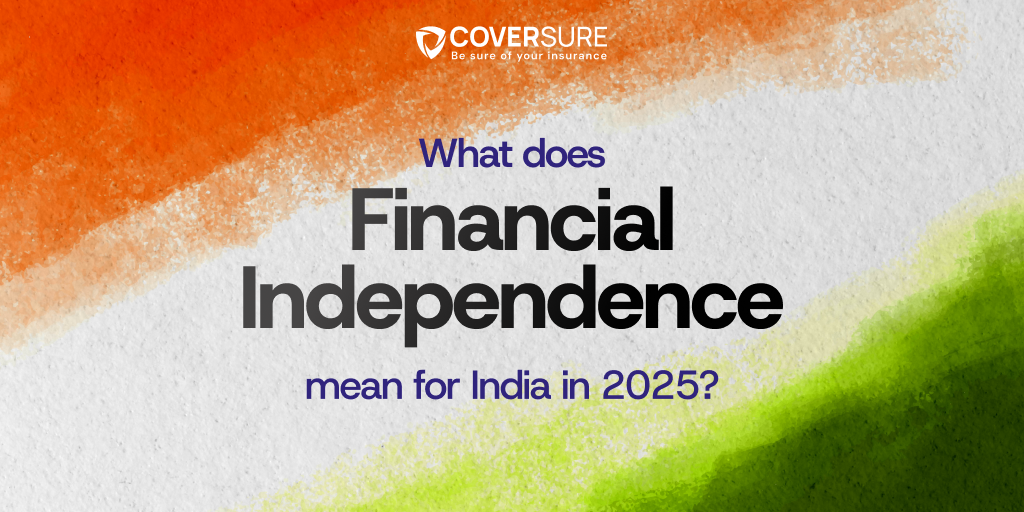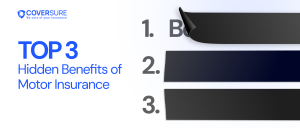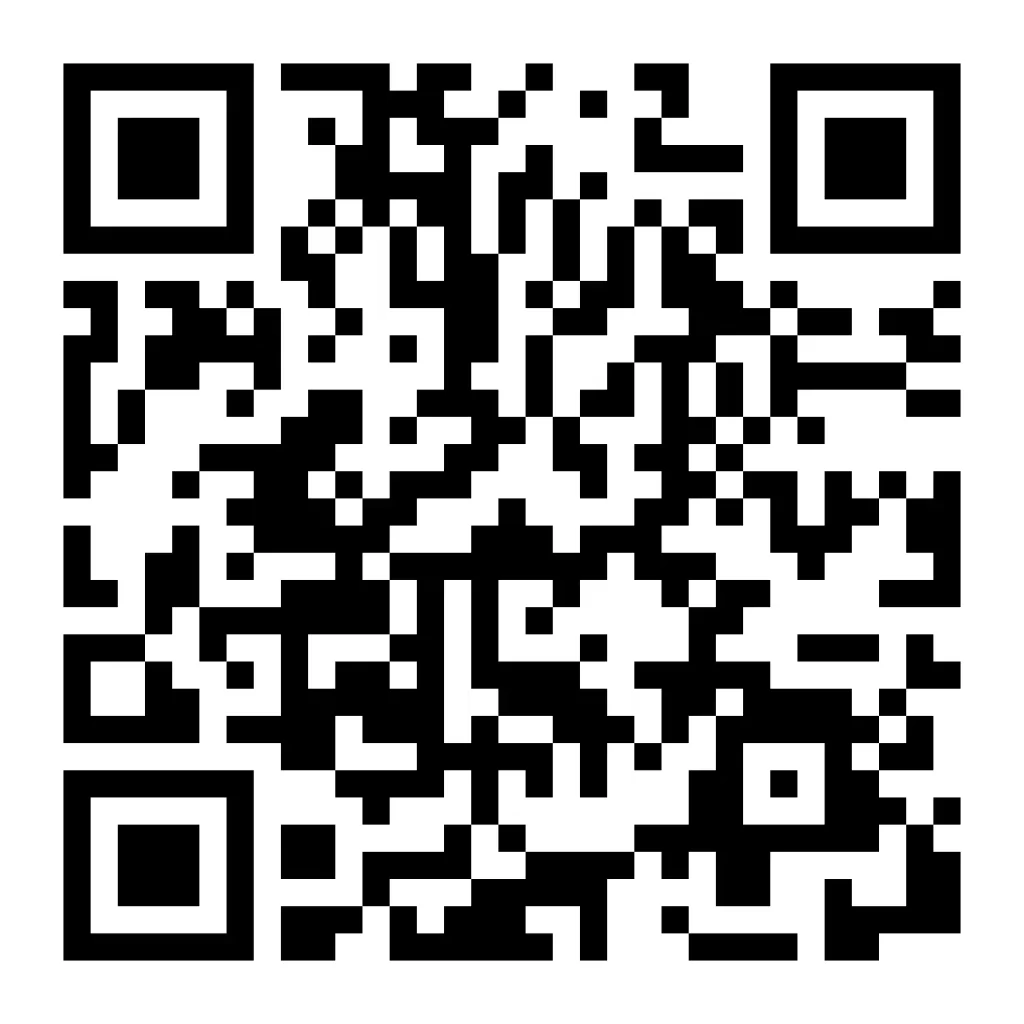“At the stroke of the midnight hour,…”
79 years ago, that’s how the nation awoke to “life and freedom”
Years later, at the cusp of an AI and financial revolution, the country is now staring down at a substantial amount of uncertainty. With the past of a sudden pandemic outbreak, India is now largely focused on 2 aspects of life –
- The obvious but suddenly surfaced brutal truth about mortality
- The financial and quality vulnerability of health aspects in a human’s life
Amidst all this chaos, India is desperately seeking a respite – a shot at financial independence.
The fun part? Financial independence doesn’t translate to the same deal for all.
What Does Financial Independence Suggest for India in 2025?
You know what we say at CoverSure about insurance?
| Understand your requirement 1st. Gauge the risks involved. Think about premiums, affordability, policy overview, and more. |
Similarly, what we say about financial independence is –
- Step 1: Gauge what “Financial Independence” means for you in 2025
- Step 2: Draft the financial goals for 2025
- Step 3: List out the financial products that can help you achieve that independence
- Step 4: Decide the % that you should be piggybanking in each product
Financial Independence in India in 2025 Ft. Age Slabs
When the CoverSure team sat down to discuss “Financial Independence and India in 2025: Insurance & Beyond,” we got a bit creative, and our surveys said –
| Age Slab | Financial Independence |
| Gen Z | The ability to purchase a Travis Scott concert ticket + “Where do I work so that I can order a Boba drink & an Avocado toast without being worried about the bill?” |
| Millennials | A solid CTC + less taxation + balance investment and insurance policies + order from Swiggy/Zomato/Blinkit twice a week. |
| Gen X | A sorted out home loan + no EMIs + SIPs doing well + “Is LIC still a good call?” |
| Baby Boomers | Retirement plan + savings + FD + “Any way my insurance covers medicine bills?” |
However, on a serious note, think of this –
- When you are between 18 to 28:
- Financial goals: You are inclined towards earning more so that you can spend more. Whether it’s the Gen Z of today or the Millennials of today, the age bracket of 18 to 28 means that you are pushing towards work with a tad bit of an inclination towards enjoying life to the fullest. Savings are the least of your considerations. The most you can think of is “how to make money from money”
- Financial Reality Check: There are 0 dependents involved (unless there is an exceptional case of your parents being retired and dependent on you). Hence, the financial bifurcations towards “being responsible” towards anyone are close to 0. All that you are thinking about is how to make the most of your earnings, which creates a chance at investment channels that fetch high returns!
- When you are between 29 to 44
- Financial goals: The savings journey starts. You are thinking of “saving some, investing some, and then DEFINITELY a solid shield.” – Loose translation? Everything, all at once.
- Financial Reality Check: Considering the peer pressure, high chances you are married with at least one kid, so at the minimum, you are looking at a spouse and a kid. And then you have parents who might be senior citizens or maybe younger.
With several such dependents, your immediate thoughts go to, “What happens to them if something happens to me?” Along with this, you also need to remember, this is the time when you are at the peak of your earning potential. So you are looking at the maximum chances to boost your financial independence!
- When you are between 45 to 60
- Financial goals: This is the final lap into employment. You are looking at saving the most with a minor risk absorption capability. So, while investments are still on the cards, a lion’s share of your financial independence now lies in savings and shielding your earnings.
- Financial Reality Check: Your retirement years are closing in. Your dependents are almost out to become financially independent. But you would still want to set aside something for them. Plus, you need to make sure that your spouse is financially shielded in the event of anything unfortunate. Investments start seeming like a risky venture, and closing EMIs – the ultimate goal.
- When you are between 61 to 79
- Financial goals: Your golden years are here. You will be reaping the results of your earnings. Risk absorption is at its lowest. You are now putting and living off of your savings. Protecting your earnings is still a good call, depending on the type of insurance you have chosen.
- Financial Reality Check: Your dependents are no longer financially reliant on you. However, this time around, you and your spouse are taking the calls about how much to shield in your savings and how much to spend. Moreover, medical expenses will become a major concern, considering age-related ailments popping up out of nowhere.
What are the Financial Products that you should be focusing on in 2025?
- USE CASE 1: If you are a Gen Z Individual (18 to 28 years)
| Risk Absorption Potential | Product Mix | Products in the Horizon |
| High | Investment 🠅Insurance ≃Savings 🠇 | SIPsStocks Health Insurance Term Insurance Motor Insurance |
a. Investment angle: Considering your age and a bright future of earning significantly, your financial risk absorption capacity is pretty high right now. This makes it the ideal time to invest in short-term and long-term channels that will fetch you high returns.
This will take up a lion’s share of your finances and build your wealth towards your targeted financial goals and financial independence!
CoverSure’s Tip: Remember to split your investment channels – never too many eggs in one basket!
b. Savings aspect: You might not be aiming at saving a lot (because of the Gen Z view of the “Life’s a soft launch — who even knows the next update?”).
However, think about this – today it’s a Travis Scott concert, but what if tomorrow BTS is in town? Save some for that at least!
c. Insurance POV: You might think that your Keto diet is going to be the golden armour for your health, but it might not be the case. Plus, if you take up –
- A term insurance plan: Since you are young, your premiums are low. And since with term insurance, your premiums stay locked in, you continue paying low premiums towards a cover that may be as much as 2 crores (depending on your age, income slab, occupation, educational qualification, etc.)
- A health insurance policy: Your medical bills are paid for, your gym fees and memberships are attended to (with the right plan), your annual health check-up is billed to the insurer (up to a capped amount), your waiting period is waited out smoothly (considering lesser chances that you have any PEDs at this age), and those healthy 10k steps you take translate into discounts on your premiums!
- Motor insurance: You start building your No-Claim bonus early and are shielded from any redundant expenses resulting from accidents or theft
CoverSure’s Tip: Choosing the right type of insurance, keeping track of the renewals, and ensuring that your family knows you are insured – all lead to a shielded finance. This ultimately builds into your financial independence since you won’t end you spending where you could have easily saved!
You can even try and download our app to help you with all of this!
- USE CASE 2: If you are a Millennial (29 to 44 years)
| Risk Absorption Potential | Product Mix | Products in the Horizon |
| Mediocre to Low | Insurance 🠅Savings 🠅Investment ≃ | SIPsStocks Health Insurance Term Insurance Motor Insurance Home LoanHome Insurance |
a. Investment angle: While you have dependents, the need to save significantly is still not exactly breathing down your neck. So, you can spend some of your finances on investment channels. Remember, this is your peak earning stage – try to grab on to long-term channels that offer guaranteed returns.
b. Savings aspect: Start your savings venture seriously. Maybe not a significant share of the earnings, but at least partially.
c. Insurance POV: This is an ideal time to be solid in terms of your insurance aspects. We say –
- A health insurance plan: Even if your employer is offering a corporate plan, go for an individual and a family floater policy (provided your current financial bandwidth supports it).
- A term insurance policy: Staying prepped for the worst may seem like a bad call, but honestly, that’s the best you can do – insuring your life’s value so that your loved ones are shielded in the worst-case scenarios.
- A home loan: Your earning potential is at its maximum. A home loan right now means you can cater to the EMIs and yet complete the loan well within your employment years.
| P.S.: Did you know that your term insurance can shield your home loan in case something unfortunate happens that compromises your earnings? |
- Home insurance: With the home that you have worked so hard to purchase, home insurance is always the right move. After all, natural and man-made calamities are never a risk worth taking.
- Motor insurance: This is not the right time to end up wasting money on issues with legal compliance or accidents, or theft. You don’t want a money pit (and not the Scrooge McDuck one) on your hands!
- USE CASE 3: If you are a Gen X Individual (45 to 60 years)
| Risk Absorption Potential | Product Mix | Products in the Horizon |
| Low | Insurance 🠅Savings 🠅Investment 🠇 | SIPs/ Stocks Savings Schemes Pension Schemes Health Insurance Term Insurance Motor Insurance Home LoanHome Insurance |
a. Investment angle: Investment channels are still on your cards. However, caution needs to be exercised. Invest in channels that involve minimum risks and guaranteed returns. At this age bracket, you are in search of a 0-tantrum financial pool that requires not much action.
b. Savings aspect: A majority of your income pool should be focused on savings by now. This will become the corpus that will solely support you in your next age bracket – the retirement years.
Make sure that you have a diverse set of channels for your savings endeavours. That way, you will be banking on different savings for different financial requirements as you approach your retirement years.
c. Insurance POV: The salt and pepper in your hair is showing up. That means a medical crisis on one end and a need for shielding your savings on the other. The best way forward with this? Insurance!
- Home loan: You should be closer to getting done with the EMIs. Congratulations! On the other hand, what is undeniable is the fatality of human lives. A term insurance can cater to the pending EMIs in case the worst happens.
- Home Insurance: It’s time to protect the asset that you have worked so hard to build. Financial security against natural disasters, theft, or accidents is crucial as you approach retirement years.
- Term Insurance: The usual suggestion goes that you get on with a term insurance policy till about 5 years after your retirement. However, there are other factors that you need to consider, for example, the dependency of your children. Based on this, you can take a call on whether you still need term insurance coverage or not.
- Health Insurance: This is close to being non-negotiable. You are growing wiser, but your body is getting fatigued. With the kind of lifestyle habits you have practiced and the environmental storms you have weathered, you are now vulnerable to multiple ailments. That means the need for a comprehensive health insurance plan that is affordable and yet ensures that you are covered in cases of hospitalization, pre and post-requirements, annual check-ups, OPD, and more.
- Motor Insurance: Your need to avail motor insurance revolves around the fact that you need to bypass expensive repairs, to have legal compliance, and to have accident coverage. This is vital for a seamless retirement plan.
- USE CASE 4: If you are a Baby Boomer (61 to 79 years)
| Risk Absorption Potential | Product Mix | Products in the Horizon |
| Low to Nil | Savings 🠅Insurance 🠅Investment 🚫 | Savings Schemes Pension Schemes Health Insurance Term Insurance/Whole Life Insurance Motor Insurance |
a. Investment angle: The risk absorption potential is at its lowest at this age bracket. Now, you are all about saving and making sure that you avoid any redundant risks to your finances.
b. Savings aspect: Your life’s savings are shining bright like a diamond in your FD, RD, savings accounts, and pension funds. This is the fruit of your labour. Make sure to keep it diversified well enough to cater to the multiple requirements you are about to encounter.
c. Insurance POV: At this stage in your life, your insurance options need to be carefully chosen. Otherwise, you may end up spending more than you are meant to shield.
- Pension Schemes: Considering that now, you are no longer actively employed, the pension schemes become your main funding to support short and long-term financial requirements.
- Health Insurance: Honestly, health insurance for senior citizens is not exactly pocket-friendly. However, if you pitch it against the total costs incurred in the case of hospitalization, the premiums seem pretty logical. And please remember, age-related ailments will pop up out of nowhere at this age, making health insurance a necessity.
- Term Insurance/Whole Life Insurance: Coming to life insurance, term or whole life insurance remains an option for you. However, it’s your call if you still want to opt for this tenure since term plans are largely supposed to act as an income replacement financial tool, and you are no longer actively employed.
- Motor Insurance: You will need a motor insurance plan for legal cover, protection from high accident costs, and safe, independent driving.
What does CoverSure say about Financial Independence?
In all its honesty, financial independence is what will actually ensure that one “feels independent.”
More often than not, when we address users over calls, our app, or on chats, we come across this phase, where an individual is unsure of their financial portfolio diversification.
We often end up discussing and asking them their age, gender, location, short-term and long-term goals, because at the end of the day, CoverSure was crafted not to sell products, but to make sure that whatever insurance products you have are good enough for you.
Hence, when it came to financial independence, all we could think of was –
“Insurance is a PART of financial independence. Acknowledging the entire portfolio of financial products and acknowledging which age demands which products and in what share is what makes it the COMPLETE package.”
Conclusion
Financial independence asks a lot from you – it’s basically a deep introspection where you decide your financial goals. Whether it be a concert ticket, a foreign trip, a health insurance coverage, savings options, a life insurance shield, or a home/motor insurance. The call is ultimately yours – the metrics to be considered? Your preferences, health conditions, genetic predispositions, financial bandwidth, risk tolerance, and most importantly, financial POV towards life.
At CoverSure, we give you that FREEDOM – making your choices sans spam calls and taking the right call with advice from industry experts.





